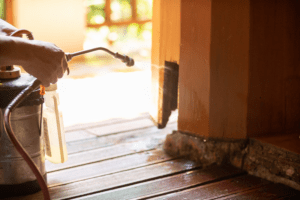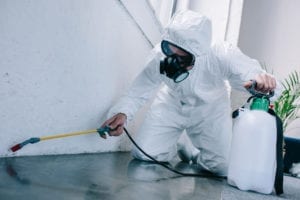
Emergency Pest Control: What to Do When an Infestation Hits Fast
There’s nothing quite like the panic that sets in when you realize your home or business has been overrun. Maybe it’s a sudden swarm of ants in your kitchen, a rat scurrying across the garage floor, or a wasp nest discovered just feet from your front door. In moments like these, the clock is ticking—and your response matters.
I’m Alex Turner, a graduate of Texas A&M University with a bachelor’s degree in Entomology. I’m the owner of a successful pest control company in Houston, and I’ve been in this business for 11 years. I also write and edit for 5Estimates, where I help people understand what to expect when pest emergencies hit hard and fast.
If you’re in the middle of an unexpected pest infestation, here’s exactly what to do—and what not to do—when time is of the essence.
What is a Pest Infestation?
A pest infestation is when unwanted insects or animals enter and multiply within a space, often creating health risks, structural damage, or discomfort for those who live or work there. It goes beyond the occasional ant sighting or a stray mouse in the garage. When pests settle in, reproduce, and become difficult to control through casual means, you’re dealing with an infestation.
Most infestations don’t happen slowly and predictably. In fact, they often feel like they appear overnight. One day your home or office seems perfectly fine. The next, there are trails of ants across your countertops, scratching noises in your walls, or cockroaches emerging when the lights go out. The speed at which pests can take over a space is alarming, and it catches many people off guard.

Why Pest Infestations Happen Quickly
Pests are opportunistic. They only need a small opening—whether it’s a crack in the foundation, an unsealed food bag, or a hidden moisture source—to start moving in. Once inside, many types of pests breed rapidly. Cockroaches, for instance, can produce hundreds of offspring in just a matter of weeks. Rodents can go from a single pair to a full-blown colony in less than two months.
Infestations often begin undetected. Most pests are excellent at hiding during the day and only becoming active at night. By the time you start noticing signs—droppings, strange odors, damage to food or wiring—the population may already be well-established.
Environmental conditions can also accelerate the process. Warm weather, high humidity, and nearby construction can all drive pests indoors, especially during seasonal transitions. For businesses or homes with ongoing food prep, pet activity, or cluttered storage areas, pests find everything they need to thrive and expand fast.
The Importance of Early Action
The longer you wait to respond to an infestation, the harder and more expensive it becomes to control. Many pests carry bacteria, trigger allergies, or cause long-term structural damage. They aren’t just inconvenient—they can be dangerous.
Understanding how quickly a pest infestation can spiral out of control is the first step toward preventing it. Sealing entry points, keeping a clean and dry space, and scheduling regular inspections with a licensed pest control professional are key ways to stay ahead of the problem.
If you suspect an infestation is starting, don’t wait for it to get worse. Early treatment is almost always faster, more effective, and more affordable than waiting until the situation becomes urgent.

Don’t Panic—Assess the Situation Quickly
The first step in any pest emergency is to stay calm and get a clear idea of what you’re dealing with. That doesn’t mean doing nothing—it means being smart before you act.
Take a few minutes to:
- Identify the pest (rats, wasps, cockroaches, termites, etc.)
- Locate where the activity is most concentrated
- Note whether the pests seem contained to one area or are spreading
This information will help guide your next steps, whether you handle the issue temporarily or call in a professional right away.
Do Not Attempt Risky DIY Methods
I’ve seen people try everything in a panic—spraying gasoline, lighting bug bombs inside, or laying out unmarked poison. These kinds of reactions not only fail to solve the problem but often make things worse or even dangerous.
If the infestation involves:
- Biting or stinging insects (wasps, spiders, fire ants)
- Rodents (which carry disease and chew wires)
- Bed bugs or cockroaches (which spread fast and require multiple treatments)
…it’s time to stop improvising and start thinking long-term.
Call a Licensed Pest Control Professional Immediately
In a true emergency, you need someone trained to act fast and apply the right treatment without creating a bigger issue. That’s where licensed technicians like my team come in.
We’re trained to:
- Identify the species
- Understand how and why they got in
- Apply targeted treatments that are fast, safe, and effective
- Implement temporary containment until full eradication is possible
Most reputable companies offer same-day or emergency pest control services, especially for severe infestations. Don’t wait until the problem spreads.

Keep People and Pets Safe
While you’re waiting for help, take steps to minimize exposure. That includes:
- Keeping children and pets away from the affected area
- Avoiding food preparation or storage near the infestation
- Sealing off rooms if possible to keep pests contained
This protects your family and keeps the problem from spreading into other parts of your home or office.
Understand the Root of the Problem
Once the immediate situation is under control, a good pest control company will help you figure out why the infestation happened in the first place.
Common causes include:
- Cracks or gaps in windows, doors, or foundations
- Standing water or leaking pipes
- Unsealed food or trash indoors
- Poor sanitation in high-traffic areas
In emergency cases, we’re not just treating the surface—we’re tracking down the conditions that allowed pests to thrive and showing you how to eliminate them.
Emergency Doesn’t Mean Temporary
Many people think that a single treatment is all it takes. Unfortunately, pest control isn’t always a one-and-done situation. Emergency services can remove the immediate threat, but long-term solutions often require:
- Follow-up visits
- Routine inspections
- Preventive treatments
- Exclusion work to seal up entry points
We make sure our clients understand that a solid prevention plan is the only way to keep infestations from returning.
What You Can Expect from Emergency Pest Services
If you’ve never called a professional for an urgent infestation, here’s what typically happens:
- Rapid response—We aim to be on-site as quickly as possible, sometimes the same day.
- Assessment and identification—We inspect the property and determine the source and scale of the problem.
- Targeted treatment—Using industry-approved products and methods, we treat the infestation safely and thoroughly.
- Follow-up plan—We’ll recommend next steps to ensure the problem doesn’t return.
Fast response is only part of the solution—quality matters just as much when dealing with emergency pest problems.

Prevention Starts After the Panic
Once we’ve tackled the issue, I always advise clients to take action to prevent a repeat. This can include:
- Sealing gaps around windows, doors, and vents
- Keeping food sealed and trash bins covered
- Regular pest inspections, especially in warmer seasons
- Cleaning up clutter, moisture, and hidden nesting spots
Emergency pest control is about speed, safety, and long-term prevention—and a good technician will walk you through all three.
Final Thoughts
No one expects a pest infestation to strike suddenly, but when it does, your reaction can make all the difference. Panic, DIY traps, and ignoring the issue only allow it to spread. Quick, professional help is the safest and smartest move you can make.
If you’re facing an emergency infestation, my best advice is simple: don’t wait. The sooner you act, the easier the recovery.
About the Author
Alex Turner is a Texas A&M University graduate with a bachelor’s degree in Entomology. He’s the owner of a successful pest control company in Houston and has worked in the pest management industry for 11 years. Alex is a writer and editor for 5Estimates, where he helps educate homeowners and businesses on smart pest control solutions.

Leave a Reply